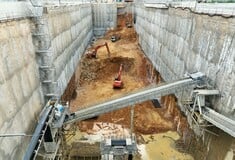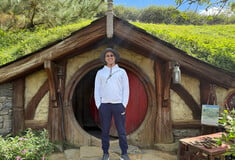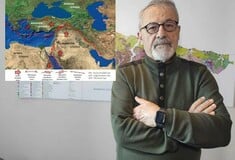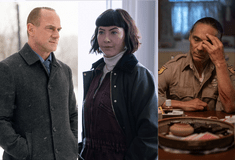Arwa Al Neami
Never Never Land
2014
"'Εβαλα την κάμερα μέσα στην abaya μου, θέλοντας να καταγράψω πως αισθάνονται οι γυναίκες όταν διασκεδάζουν"

"My project is based on observations I recoded when visiting amusement parks in Abha and elsewhere in Saudi Arabia throughout the years. Back in 2006, my brother and I would go to the amusement park in Abha together and sit on the same ride. In 2010, I went there again and was surprised to find that there was gender segregation. In 2013, I noticed a sign, which reads: "It is strictly prohibited to lift the abaya and show the pants and to scream during the rides, and whoever violates these rules will be taken off the ride before completing it." This is where the idea for Never Never Land came from."
Από συνέντευξη της Arwa Al Neami στην Mai Y. Al-Farhan, research associate στο Arab Gulf States Institute (Washington)

"As I walked in the amusement park after reading the sign, I noticed that there was a black leather cover on all rides to conceal women's legs, preventing their pants from showing. Ever since this visit, I started to make annual trips to Abha's amusement park to document changes occurring there. With all these mounting restrictions, women are still having fun. They now have "fun" challenges to make sure their pants aren't showing as well as to try and not scream, even when they are in a ride like drop zone, which is impossible. Women are screaming, singing, and basically giving the religious police a hard time, as they cannot tell which woman is responsible for screaming out of all the women in black abayas and niqabs."

"In the past, Asir was one of the most culturally open provinces in Saudi Arabia in terms of gender inclusiveness. Women were involved in agriculture alongside men; women would sell goods in souqs, and women would overall work with men whether in agriculture, business, even in building houses and artistically decorating them. Asir was such a rich place culturally and socially filled with music and traditional arts festivals. Post-1979, a considerable change in Asir happened mainly due to Islamist movements. Women gradually started to appear less in public. You now find older women more open minded than young women. This experience made me track societal changes in my artwork in "Never Never Land" and other projects that I've worked on."

"Entertainment in Saudi Arabia needs time. It is going to be difficult for people to adjust quickly to the recent changes and advances in entertainment. The younger generations will have a better chance at adapting than older generations as they are exposed to music and the arts on social media and through other mediums. Saudi Arabia has a wealth of singers, artists, and actors. We had a thriving theater scene, such as Al-Muftaha theater in Abha, which hosted one of the first musical concerts in Saudi Arabia. It is the same theater where the famous Saudi singer Talal Maddah died while performing on stage."
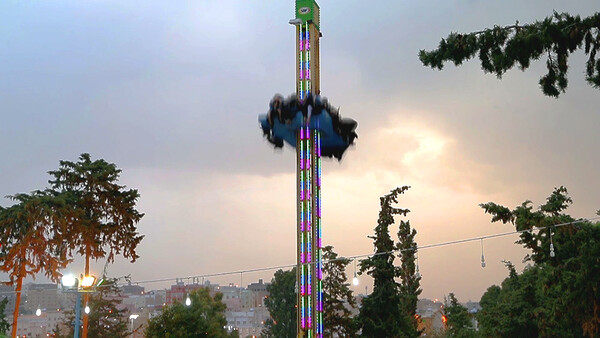
"As a woman, many Saudis do not recognize or acknowledge you as an independent artist. Working as a female artist is something that much of Saudi society cannot fathom, as there is no real appreciation for women in the arts. Some, not all, view art as something that is not primary but secondary and minor. The reason why is because we still lack art galleries, museums, and education that highlights the role of art. For example, I have encountered many difficulties in explaining my work to others; contemporary art is still not fully understood, among other forms of art, let alone explaining that this is my profession."

"Saudi Arabia is now witnessing a revolution in the arts. There is a recent realization of the arts in Saudi society, thanks to social media. This has led many people to call themselves "artists." While everyone has the right to become an artist, much of what I am seeing is just a repetition of other works, something that I would call "copy and paste." The art I am seeing nowadays is characterized by confusion and lack of clarity, lack of artistic taste. However, there remain a considerable number of artworks that are genuine and unique. I project that Saudi Arabia, under the current administration, will have a wonderful future for people in the arts, but this will require some time."



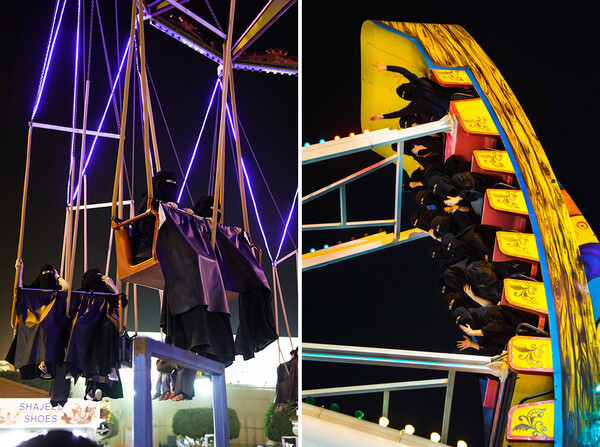

Where censorship is widespread, satire, parody, and political humor are often the best or only means available to air opinions, voice dissent, or challenge government institutions or officials. Mockery can destroy mystique, break tensions, and disarm seemingly omnipotent, oppressive powers. In countries like Saudi Arabia, where public protest is forbidden and political activism is curtailed, there is a fount of material which artists are tapping into with great success.
This project uses the quality of humour to test the potential of art as a critical instrument for the analysis of social, political and cultural issues. A response to an outburst of creative dissent in recent years, the project features a wealth of short films, animations, posters, installations and works that are at times witty, wry and sometimes hold dark observations on everyday life, while simultaneously offering insightful commentary on the absurdities of human relationships.
"Every Joke is a Tiny Revolution" - George Orwell
Arwa Al Neami




